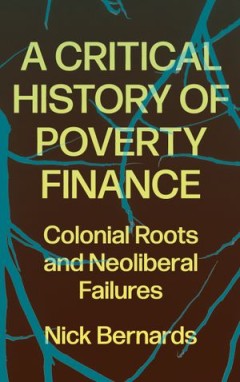Filter by

Afropolitan Horizons : Essays toward a Literary Anthropology of Nigeria
Nigeria is a country shaped by internal diversity and transnational connections, past and present. Leading Nigerian writers from Chinua Achebe, Amos Tutuola and Wole Soyinka to Chimamanda Ngozi Adichie and Teju Cole have portrayed these Nigerian issues, and have also written about some of the momentous events in Nigerian history. Afropolitan Horizons discusses their work alongside other novelis…
- Edition
- -
- ISBN/ISSN
- 9781800732995
- Collation
- -
- Series Title
- -
- Call Number
- -

AfroAsian Encounters
With a Foreword by Vijay Prashad and an Afterword by Gary Okihiro How might we understand yellowface performances by African Americans in 1930s swing adaptations of Gilbert and Sullivan's The Mikado, Paul Robeson's support of Asian and Asian American struggles, or the absorption of hip hop by Asian American youth culture? AfroAsian Encounters is the first anthology to look at the mutual influen…
- Edition
- -
- ISBN/ISSN
- 9780814769270
- Collation
- -
- Series Title
- -
- Call Number
- -

Afrikaners and the boundaries of faith in post-apartheid South Africa
This book examines the shifting moral and spiritual lives of white Afrikaners in South Africa after apartheid. The end of South Africa’s apartheid system of racial and spatial segregation sparked wide-reaching social change as social, cultural, spatial and racial boundaries were transgressed and transformed. This book investigates how Afrikaners have mediated the country’s shifting boundari…
- Edition
- -
- ISBN/ISSN
- 9781003185574
- Collation
- 195
- Series Title
- Routledge Contemporary South Africa
- Call Number
- -

A Fleet Street In Every Town :The Provincial Press in England, 1855-1900
"At the heart of Victorian culture was the local weekly newspaper. More popular than books, more widely read than the London papers, the local press was a national phenomenon. This book redraws the Victorian cultural map, shifting our focus away from one centre, London, and towards the many centres of the provinces. It offers a new paradigm in which place, and a sense of place, are vital to the…
- Edition
- -
- ISBN/ISSN
- 9781783745616
- Collation
- 469 hlm
- Series Title
- -
- Call Number
- -

A Family Occupation : Children of the War and the Memory of World War II in D…
Many of today's Dutch writers were children during World War II. Even today, the traumatic childhood experience of enemy occupation is still central to the work of many of them. This interest cuts across the traditional boundaries between fiction, autobiography and the literature of trauma and recovery. A Family Occupation is the first English-language introduction to Dutch-language texts writt…
- Edition
- -
- ISBN/ISSN
- 9789053562369
- Collation
- 208 halaman
- Series Title
- -
- Call Number
- 800 TAY f

African Literature in the Digital Age
The first book-length study on the relationship between African literature and new media. The digital space provides a new avenue to move literature beyond the restrictions of book publishing on the continent. Arguing that writers are putting their work on cyberspace because communities are emerging from this space, and because increasing numbers of Africans use the internet as part of their da…
- Edition
- -
- ISBN/ISSN
- 9781847012388
- Collation
- -
- Series Title
- -
- Call Number
- -

A Critical History of Poverty Finance: Colonial Roots and Neoliberal Failures
Beyond Money shows that, by organising around post-money versions of the future, activists have a hope of creating a world that embodies their radical values and visions.
- Edition
- -
- ISBN/ISSN
- 9780745344867
- Collation
- -
- Series Title
- -
- Call Number
- 337 BER c

African identities and international politics
Using the lenses of realism, liberalism, the English School and constructivism, this book explains how the divisions and differences in African identities affect African international politics. This book explores the African condition in the twenty-first century. It analyses how geographical, racial, ethnic, linguistic, religious and power differences shape continental and intercontinental rel…
- Edition
- -
- ISBN/ISSN
- 9781003176732
- Collation
- 176
- Series Title
- -
- Call Number
- -

A Corpus of Roman Pottery from Lincoln (Volume 6)
This is the first major analysis of the Roman pottery from excavations in Lincoln (comprising more than 150,000 sherds). The pottery is presented in seven major ware groups. Fine wares include a modest range of imports and are dominated by Nene Valley products. Oxidised wares are mostly local products with a few imports as are the shell- and calcite-tempered wares and reduced wares. The final t…
- Edition
- -
- ISBN/ISSN
- 9781789256567
- Collation
- -
- Series Title
- -
- Call Number
- -

A Corpus of Anglo-Saxon and Medieval Pottery from Lincoln
This volume reports on the Anglo-Saxon and Medieval pottery found during various archaeological excavations in the city from 1970 until 1987. The authors present a city-wide pottery classification system and analyse the sequence of pottery types through time and at numerous sites. They make extensive use of petrological analysis, including the study of over 600 thin-sections. These have been us…
- Edition
- -
- ISBN/ISSN
- 9781842170830
- Collation
- -
- Series Title
- -
- Call Number
- -
 Computer Science, Information & General Works
Computer Science, Information & General Works  Philosophy & Psychology
Philosophy & Psychology  Religion
Religion  Social Sciences
Social Sciences  Language
Language  Pure Science
Pure Science  Applied Sciences
Applied Sciences  Art & Recreation
Art & Recreation  Literature
Literature  History & Geography
History & Geography